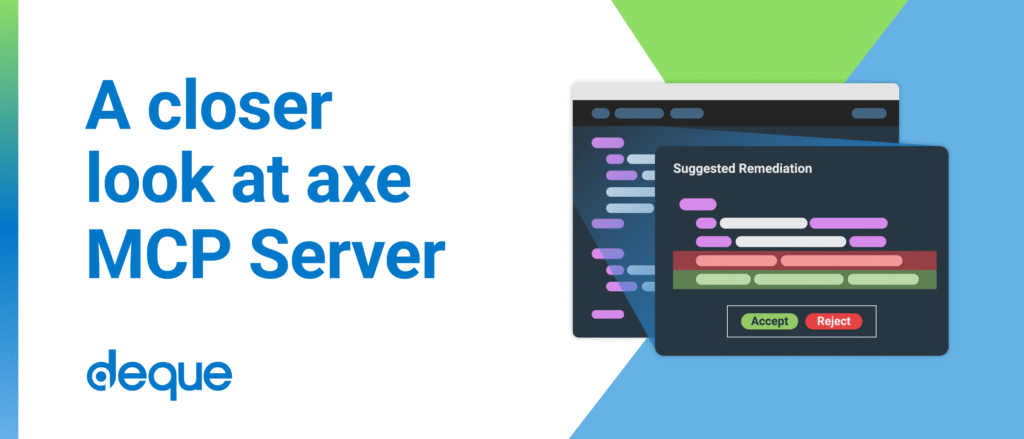In our recent webinar, Axe MCP Server: Digital accessibility expertise right in your AI agent, Glenda Sims and I explored how Deque is transforming digital accessibility by using MCP (Model Context Protocol), and demonstrated how the axe MCP Server brings that vision to life. Axe MCP Server not only allows developers to fix more issues faster and keeps developers focused and in flow, but it also empowers every developer with immediate accessibility expertise, regardless of skill level. This technology is truly a game-changer.
By 2027, 65% of enterprise automation is predicted to run through MCP, promising to transform accessibility into an integrated, proactive part of design and development. This frees up your accessibility experts to focus on strategic innovation instead of spending time chasing avoidable issues, which means more impactful and mature accessibility strategies.
The incredible turnout for our webinar spoke volumes about people’s interest in this topic, and a ton of great questions came through during our live session. There wasn’t enough time to get to all of them, so I wanted to follow up with some additional information, address common themes, and dive deeper into what makes axe MCP Server so unique.
What makes axe MCP Server unique?
What differentiates it from other tools is that, under the hood, axe MCP Server runs on the same trusted engine as the axe DevTools Extension, ensuring that the same unique and rigorous accessibility testing happens as it analyzes your code. It also leverages your and your organization’s settings and policies which are managed using the axe Platform.
Layered on top is axe Assistant, Deque’s generative AI chatbot, with access to all of the knowledge in Deque University—the most comprehensive digital accessibility knowledge base. Axe Assistant takes the question or task given by the user and uses this expert knowledge to ensure that consistent and accurate answers are delivered. In the context of the axe MCP server, axe Assistant provides a remediation tool that delivers high-quality remediation guidance back to the AI agent in the IDE.
Axe MCP Server’s ability to understand and accurately respond to nuanced and specialized digital accessibility needs—that more general tools are likely to misunderstand or misinterpret—is really important for teams to be able to trust the outputs they’re getting.
How does data stay secure with axe MCP Server?
When it comes to security, axe MCP Server adheres to the enterprise settings you have configured for the use of axe DevTools in general. It is built with enterprise-grade protections and adheres to Deque’s privacy policy and the settings you configure. For the generative AI remediation guidance, no data is ever stored; it is only used in dynamic memory to produce the guidance for the AI agent.
How does axe MCP Server build on the power of axe-core?
It’s important to note that axe MCP Server doesn’t replace axe-core; it builds on it.
Axe-core remains the industry standard for reliable, rules-based accessibility testing. It’s trusted by billions of users and powers Deque’s most widely used tools. Axe MCP Server builds on that solid foundation by adding additional functionality directly into the developer’s environment.
Through integration with axe Assistant, axe MCP Server connects to your AI coding agent to deliver contextual, expert-based remediation guidance. It understands your code environment and then communicates how to fix issues in clear, developer-friendly language.
How does axe MCP Server fit in with axe DevTools Linter?
If you’re using axe DevTools Linter, you’re already catching accessibility issues early in the development process through testing code in your IDE. Axe MCP Server complements this approach by introducing additional intelligence and context.
Axe MCP Server understands the rendered state of your application and can assess accessibility issues in a more dynamic, contextualized way. This makes it possible to give actionable guidance in natural language based on specific prompting—all while still in your IDE.
What platforms does axe MCP Server support?
Axe MCP Server supports major IDEs and AI-powered coding assistants such as GitHub Copilot, Cursor, Claude Code, Windsurf, and VS Code—as well as any agent that supports MCP. This makes it easy to integrate accessibility testing directly into the tools developers are already using.
Currently, axe MCP Server focuses on web environments, with plans to expand into native mobile testing in the future. The long-term vision includes access to the entire axe Platform over time.
We also know it’s important to understand the impact on screen reader-specific issues. Axe MCP Server can detect these issues because it is powered by axe DevTools, which takes screen readers into account in the checks it performs.
How does axe MCP Server support roles outside of developers?
Axe MCP Server is designed for the entire accessibility team. While it’s a natural fit for developers, helping them stay in the flow and resolve issues faster, it can also help larger accessibility teams.
For accessibility specialists, it can be used in conjunction with other enterprise applications such as JIRA. It can fetch recently resolved issues from JIRA and automatically validate these through the MCP server “analyze” tool.
As we deliver more and more of the axe Platform functionality through the MCP server, more roles and use cases will become possible. With axe MCP server, you can achieve accessibility at the speed of AI.
Watch the full webinar
If you weren’t able to attend the live event, you can watch the full webinar on demand for a full walkthrough and demo of axe MCP Server in action.
Interested in seeing axe MCP Server in action? Request a demo today!
